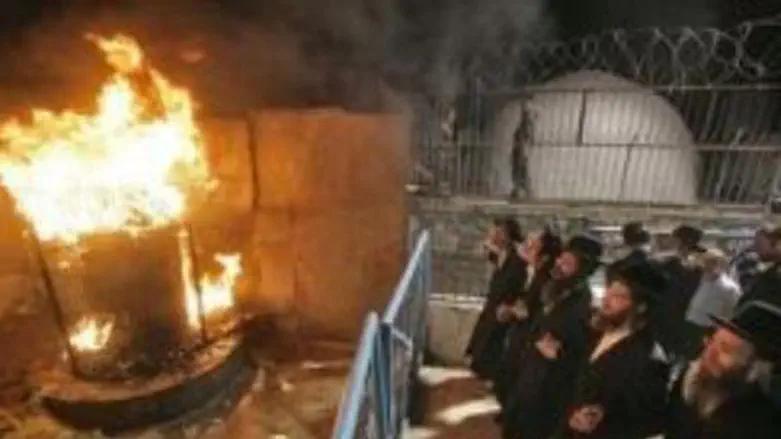
"Rabbi Akiva said, how lucky you are, O Israel, for just as a mikva purifies, G-d purifies the people of Israel" - this is one of the refrains sung over and over by hundreds of thousands at Meron on the night of Lag Ba'Omer as they sway back and forth in place for lack of room to dance. "How lucky we are and how good is our inheritance, at the hillula for Rabbi Shimon bar Yochai", they continue to chant.
Hundreds of thousands of Jews will be in Meron on Saturday night to celebrate Lag Ba'Omer. The holiday marks the passing of Tannaitic Sage Rabbi Shimon Bar Yochai (Rashbi), but has no laws or special Torah readings.
The commentary on the Pentateuch called the Zohar (Shining Light), the classical source of Jewish mysticism, is attributed to Rashbi, who lived in the 2nd century C.E, is said to have died on Lag B'Omer and is buried in Meron.
The Talmud tells how Rashbi was forced to hide in a cave with his son for twelve years in order to escape the Romans who wanted to kill him for rebellion. During this period, the Talmud relates that a carob tree and spring of fresh water were the pair's only sustenance, and that he and his son reached spiritual heights in Torah study and kabbala that made their return to the everyday world a difficult transition. They left the cave upon hearing that the Roman ruler had died.
Rashbi is revered as a mystic, supremely pious sage, who did not engage in worldly pursuits. On the day of his death, he is said to have revealed deep kabbalistic secrets and the day was miraculously extended until he had completed his final teaching. The custom of lighting fires on his yahrzeit (anniversary of death) symbolizes this revelation of powerful light.
The night of Lag Ba'Omer, the Boyaner Hassidic Rabbi lights the first flame of the festivities at midnight and the thousands who have come to Meron continue to sing and dance through the night, chanting the refrains of various songs praising Rashbi, expressing the joy of being a Jew, calling on G-d to deliver His people from danger, and describing their confidence that He purifies them from transgressions.
Last year hundreds of thousands celebrated the day that honors him in Meron. This year even more are expected to reach the Galilee town, and many managed to get there, after the Sabbath was over at approximately 8 P.M., by midnight. Many more are expected throughout the day. Flights bring hassidim from over the ocean to join the "hillula", the word for the celebratory memorial of a revered sage.
Among them are many three year old boys, brought by their families - even from overseas - for their first haircut, called "khalaka" or "upsherin" in Yiddish, which is traditionally done by hassidim in Meron on Lag Ba'Omer. After the haircut, the child begins to wear a yarmulke and tzitzis, the fringed garment that reminds Jews of their committment to mitzvot.
Lag Ba'Omer also breaks (or ends, depending on one's custom) the mourning period for Rabbi Akiva's 24,000 students, who died of a plague that ended on this day. Schoolchildren once would go out to the forests with bows and arrows on Lag Ba'Omer in memory of Rabbi Akiva's students who pretended to be hunting so that the Romans would not kill them for studying Torah.
Israel's first-response group, Magen David Adom (MDA) will be at the scene and will be on high alert until Monday night, with one central station and two clinics operating in Meron for the next three days.
Police in the northern district are in full force to guide traffic in and around Meron.
Preparations are taking place elsewhere in the country as well. While police and paramedics prepare to deal with traffic and respond to injuries, children across Israel are gathering wood for the traditional Lag B'Omer bonfires, which light up the skies all over the country.
Rabbis have called on the public to avoid desecrating the Sabbath in their preparations for the holiday. The Education Ministry has given Israeli schoolchildren Sunday and Monday off in the hope that most would postpone their bonfires for Sunday night, but the idea did not really take off.
On Sunday, Lag Ba'Omer day, Chabad holds its annual children's marches in many areas of Israel, such as Kiryat Moshe and Ramot in Jerusalem. Chabad's Great Parade in Brooklyn, New York is on Sunday, April 28, starting at 10 a.m. on Eastern Parkway between Brooklyn and Albany Avenues. The New York parade is the largest children's event held in that city, with 35,000 children expected.
In light of the recent terrorist attack in Boston, organizers of the Great Parade and the NYPD issued strict security guidelines, including confiscation of unattended personal obects and not allowing backpacks or suitcases. Participants and onlookers are asked to alert security if there is any suspicious activity.
There will be a large police presence at the parade. Community volunteers will also be patrolling the area.
The parade itself will be as colorful as ever: Military and school marching bands, a Jewish motorcycle club, Yeshiva students doubling up as acrobats and giant floats atop flat-bed trucks will follow more than one hundred schools.
Famed Jewish entertainer Benny Friedman, Uncle Moishy, and the Yeshiva Boys Choir will be performing live concerts. There will be a fair with rides, games and a petting zoo after the parade.
Rabbi Shimon Hecht, the director of the parade, sees the festivities as being about broader ideas: “The parade is really about unity and community, and it’s about taking pride in a unique identity and heritage,” he said, adding, “and of course, having a lot of fun”.